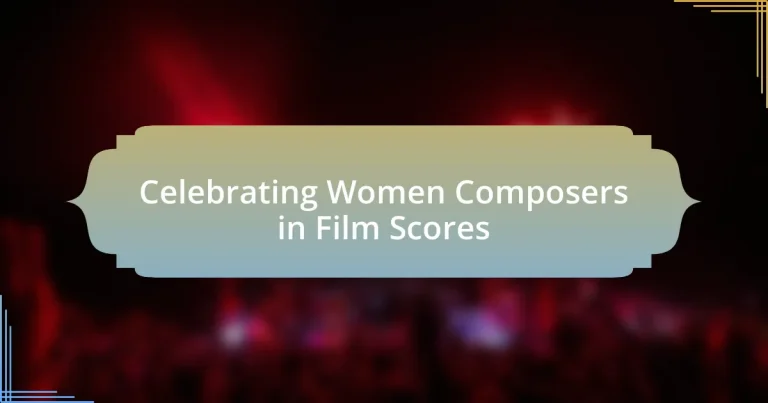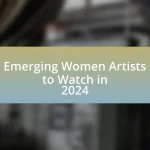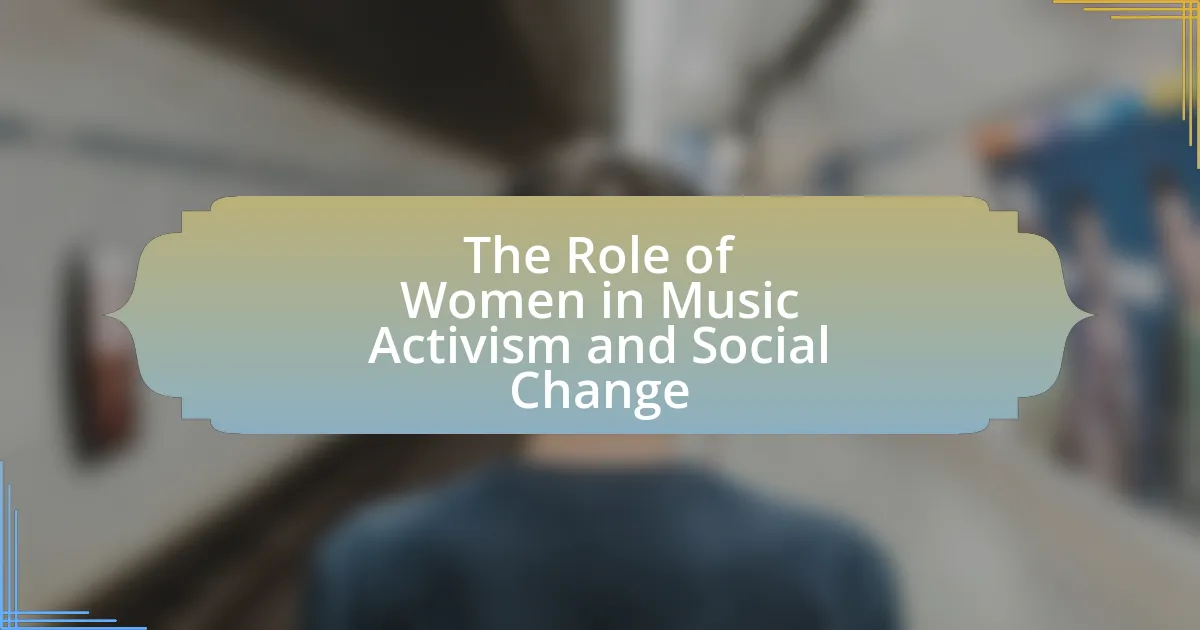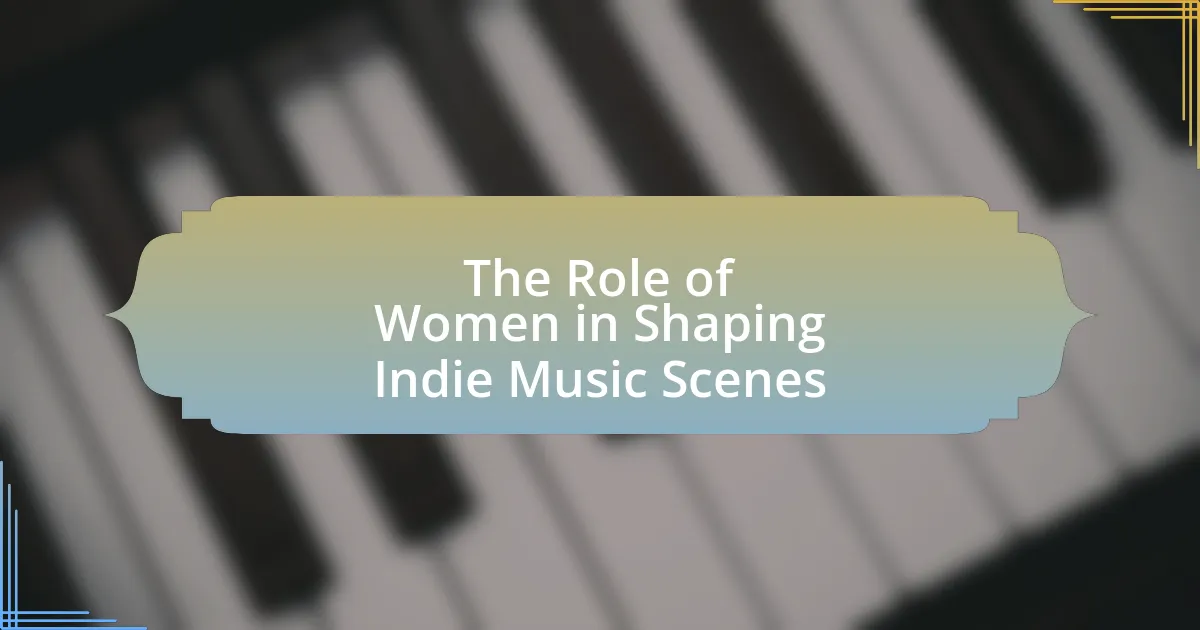The article focuses on the significance of celebrating women composers in film scores, emphasizing their contributions to gender equality and representation in a male-dominated industry. It highlights the influence of notable composers such as Rachel Portman and Hildur Guðnadóttir, who have shaped the film score landscape and inspired future generations. The discussion includes the barriers women face in the profession, the importance of recognition, and the impact of mentorship and support systems. Additionally, it addresses the need for initiatives promoting gender equality and how audiences can contribute to the celebration of women composers in film music.
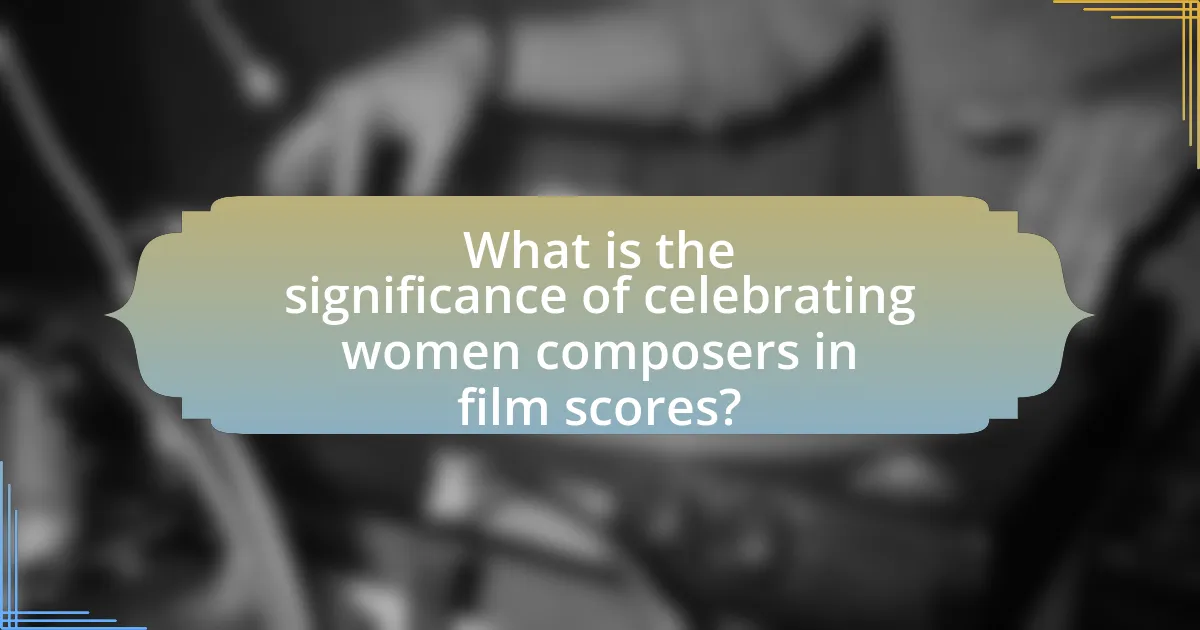
What is the significance of celebrating women composers in film scores?
Celebrating women composers in film scores is significant because it promotes gender equality and representation in a historically male-dominated industry. Recognizing the contributions of women composers, such as Rachel Portman and Hildur Guðnadóttir, not only highlights their artistic achievements but also inspires future generations of female musicians. Studies indicate that female representation in film music can lead to more diverse storytelling and perspectives, enriching the cinematic experience. For instance, Hildur Guðnadóttir won an Academy Award for her score in “Joker,” showcasing the impact of women’s work in shaping modern film narratives.
How have women composers influenced the film score industry?
Women composers have significantly influenced the film score industry by breaking gender barriers and introducing diverse musical perspectives. Notable figures like Rachel Portman, the first woman to win an Academy Award for Best Original Score in 1997 for “Emma,” have paved the way for greater representation. Additionally, composers such as Hildur Guðnadóttir, who won an Oscar for “Joker” in 2020, have showcased the emotional depth and innovative soundscapes that women bring to film music. Their contributions have not only enriched the auditory experience of films but have also inspired a new generation of female composers to enter the industry, thereby fostering a more inclusive environment.
What are some notable contributions by women composers in film history?
Women composers have made significant contributions to film history, with notable figures such as Rachel Portman, who became the first female composer to win an Academy Award for Best Original Score for “Emma” in 1997. Another prominent composer, Hildur Guðnadóttir, won an Academy Award for her score in “Joker” in 2020, marking a pivotal moment for women in the industry. Additionally, composers like Shirley Walker, known for her work on “Batman: The Animated Series,” and Anne Dudley, who won an Oscar for “The Full Monty,” have also left a lasting impact on film music. These achievements highlight the increasing recognition and influence of women in a traditionally male-dominated field.
How do women composers’ perspectives shape film music?
Women composers shape film music by infusing diverse emotional narratives and unique cultural perspectives into their scores. Their experiences often lead to innovative approaches in composition, resulting in soundtracks that resonate with broader audiences. For instance, composers like Hildur Guðnadóttir, who won an Academy Award for her work on “Joker,” utilize their distinct viewpoints to create hauntingly beautiful soundscapes that enhance storytelling. This influence is evident in the way women composers often prioritize character development and emotional depth, as seen in the works of Rachel Portman and Mychael Danna, who both emphasize the psychological aspects of their characters through music. Their contributions not only diversify the film music landscape but also challenge traditional norms, paving the way for future generations of composers.
Why is recognition of women composers important in today’s film industry?
Recognition of women composers is crucial in today’s film industry because it promotes diversity and inclusivity, which enhances the richness of storytelling in cinema. Historically, women have been underrepresented in film scoring, with only about 2% of film scores composed by women in the past decade, according to a study by the Annenberg Inclusion Initiative. Acknowledging their contributions not only empowers female composers but also inspires future generations to pursue careers in this field, ultimately leading to a broader range of perspectives and narratives in film.
What barriers have women faced in the film scoring profession?
Women in the film scoring profession have faced significant barriers, including gender bias, lack of representation, and limited access to networking opportunities. Gender bias manifests in the form of stereotypes that question women’s technical abilities and creative authority, often leading to fewer opportunities for women to be hired for scoring projects. The lack of representation is evident in the statistics; as of 2020, only 2% of film scores were composed by women, highlighting the systemic underrepresentation in the industry. Additionally, limited access to networking opportunities restricts women’s ability to connect with influential industry figures, further hindering their career advancement. These barriers collectively contribute to the challenges women encounter in establishing themselves as prominent composers in film scoring.
How does celebrating women composers impact future generations?
Celebrating women composers positively impacts future generations by providing role models and fostering diversity in the music industry. When women composers are recognized, it encourages young female musicians to pursue careers in composition, as evidenced by the increasing number of women entering music programs after initiatives highlighting female composers. Research shows that representation in the arts leads to greater participation; for instance, a study by the National Endowment for the Arts found that visibility of diverse artists increases interest and engagement among underrepresented groups. This celebration not only validates the contributions of women in music but also enriches the cultural landscape, inspiring future generations to create and innovate.
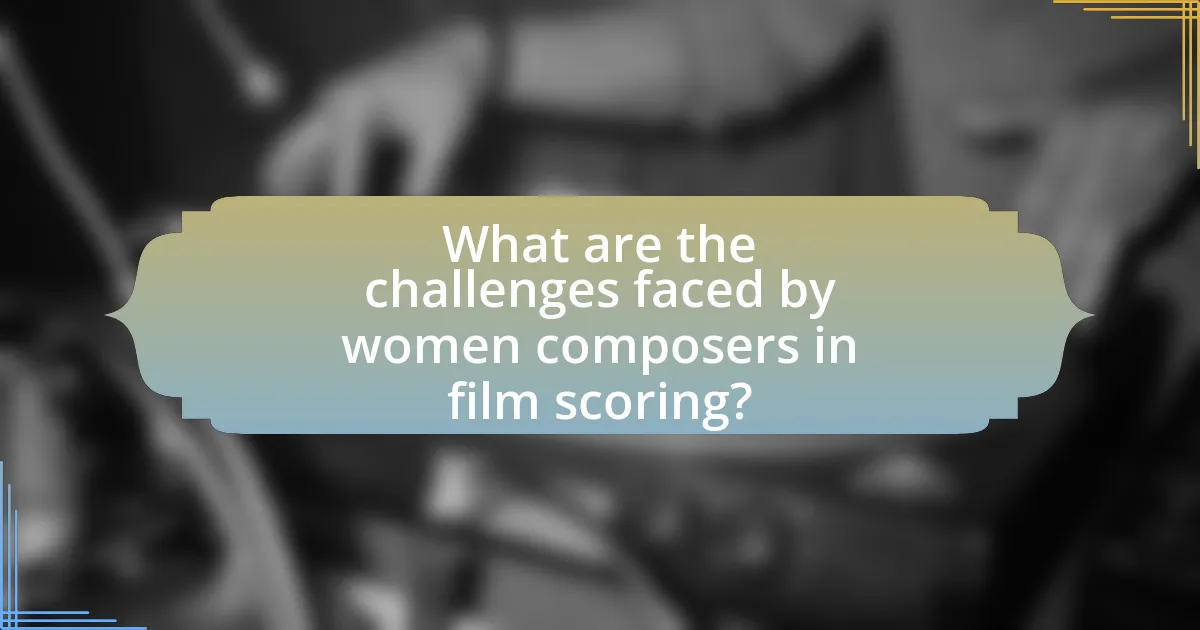
What are the challenges faced by women composers in film scoring?
Women composers in film scoring face significant challenges, including gender bias, lack of representation, and limited access to networking opportunities. Gender bias manifests in the perception that women are less capable of handling large-scale projects, which can lead to fewer opportunities for women in high-profile films. According to a study by the Annenberg Inclusion Initiative, only 2% of the top-grossing films from 2007 to 2019 featured female composers, highlighting the stark underrepresentation in the industry. Additionally, women often encounter barriers in networking and mentorship, which are crucial for career advancement in a male-dominated field. These challenges contribute to a cycle that perpetuates the lack of diversity in film scoring.
How do gender biases affect opportunities for women in film music?
Gender biases significantly limit opportunities for women in film music by perpetuating stereotypes that favor male composers. Research indicates that women comprise only about 2% of film composers in major studio films, reflecting systemic barriers such as lack of access to networking opportunities, mentorship, and funding. For instance, a study by the Annenberg Inclusion Initiative found that from 2007 to 2019, only 3% of the top 100 grossing films featured female composers, highlighting the stark underrepresentation. These biases create an environment where women’s contributions are undervalued, leading to fewer opportunities for them to secure projects or recognition in the industry.
What statistics highlight the underrepresentation of women in film scoring?
Women are significantly underrepresented in film scoring, with statistics indicating that only about 2% of film scores are composed by women. A study conducted by the Annenberg Inclusion Initiative in 2020 revealed that out of 1,300 films analyzed from 2007 to 2019, only 3.4% of the credited composers were women. Additionally, the 2021 report from the Alliance for Women Film Composers found that women composed only 6% of the top 100 grossing films in 2020. These figures underscore the persistent gender disparity in the film scoring industry.
How can the industry address these biases effectively?
The industry can address biases against women composers in film scores by implementing equitable hiring practices and promoting diversity initiatives. Establishing mentorship programs specifically for women in music composition can help bridge the gap in opportunities. Research indicates that diverse teams produce more innovative outcomes; for instance, a McKinsey report found that companies in the top quartile for gender diversity are 21% more likely to outperform on profitability. Additionally, increasing visibility through awards and recognition for women composers can challenge stereotypes and encourage broader acceptance within the industry.
What support systems exist for women composers in the film industry?
Support systems for women composers in the film industry include organizations like the Alliance for Women Film Composers, which provides networking opportunities, mentorship, and resources specifically for female composers. Additionally, initiatives such as the Women in Film organization advocate for gender equality and offer grants and scholarships to support women in various roles within the industry, including composition. Research indicates that these support systems have led to increased visibility and opportunities for women composers, contributing to a more diverse representation in film scoring.
What organizations promote women in film music?
Organizations that promote women in film music include the Alliance for Women Film Composers, which advocates for female composers in the industry, and Women in Film, which supports women across all areas of the film industry, including music. Additionally, the International Alliance for Women in Music focuses on increasing the visibility of women composers globally. These organizations provide networking opportunities, resources, and platforms to highlight the contributions of women in film music, thereby fostering a more inclusive environment in the industry.
How can mentorship programs benefit aspiring women composers?
Mentorship programs can significantly benefit aspiring women composers by providing them with guidance, networking opportunities, and industry insights. These programs connect emerging composers with experienced professionals who can offer personalized advice, share their experiences, and help navigate the complexities of the music industry. Research indicates that mentorship can enhance career development; for instance, a study by the American Psychological Association found that mentees are more likely to achieve their career goals and gain confidence in their abilities. Additionally, mentorship fosters a supportive community, which is crucial in an industry where women are often underrepresented. By participating in mentorship programs, aspiring women composers can gain access to valuable resources and connections that can propel their careers forward.
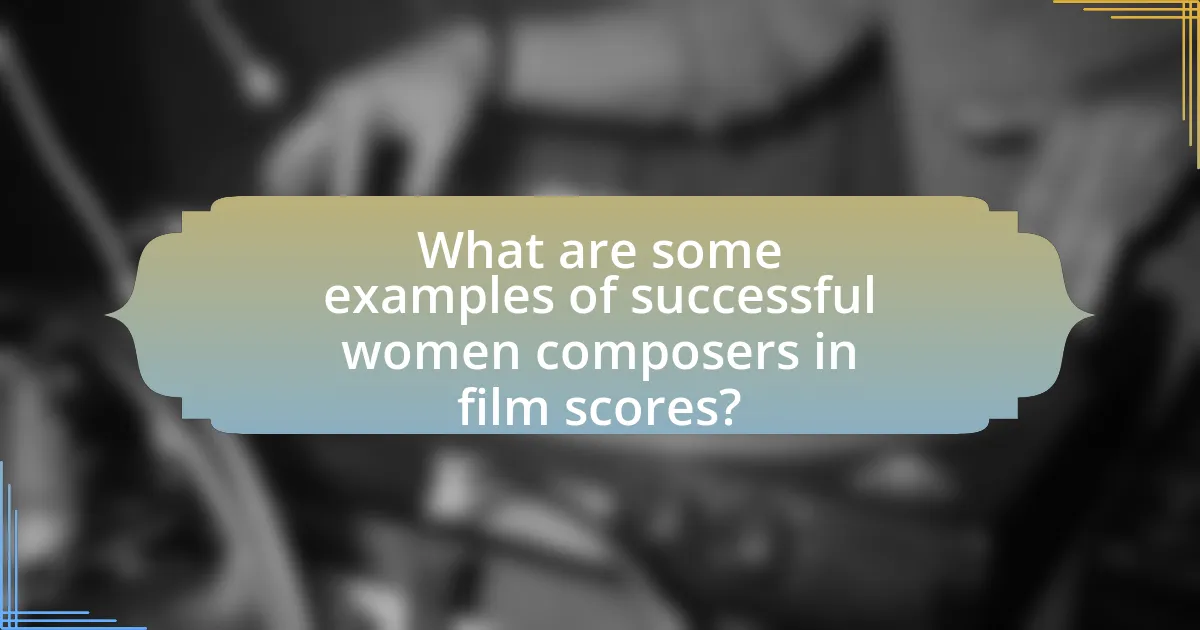
What are some examples of successful women composers in film scores?
Some examples of successful women composers in film scores include Hildur Guðnadóttir, who won an Academy Award for her score in “Joker,” and Rachel Portman, the first female composer to win an Oscar for “Emma.” Additionally, Anne Dudley received an Academy Award for her work on “The Full Monty,” and Laura Karpman has been recognized for her contributions to various projects, including “Lovecraft Country.” These composers have made significant impacts in the film industry, showcasing their talent and paving the way for future generations of women in music.
Who are the leading women composers making an impact today?
The leading women composers making an impact today include Hildur Guðnadóttir, who won an Academy Award for her score in “Joker,” and Natalie Holt, known for her work on “Loki.” These composers are recognized for their innovative contributions to film music, with Guðnadóttir’s haunting soundscapes and Holt’s dynamic orchestration gaining critical acclaim. Their achievements highlight the growing presence and influence of women in the film scoring industry, as evidenced by increasing nominations and awards in prestigious ceremonies.
What are their most acclaimed works in film scoring?
Their most acclaimed works in film scoring include “The Piano” by Michael Nyman, “Atonement” by Dario Marianelli, and “Frozen” by Kristen Anderson-Lopez and Robert Lopez. Michael Nyman’s score for “The Piano” received an Academy Award nomination and is celebrated for its emotional depth. Dario Marianelli won an Academy Award for “Atonement,” recognized for its innovative use of sound and music to enhance the narrative. Kristen Anderson-Lopez and Robert Lopez’s work on “Frozen” earned them an Academy Award for Best Original Song and has become iconic in contemporary film music.
How have their styles and techniques evolved over time?
Women composers in film scores have evolved their styles and techniques significantly over time, transitioning from traditional orchestration to incorporating diverse musical elements and technology. Early female composers often adhered to classical forms and orchestral arrangements, while contemporary composers like Hildur Guðnadóttir and Rachel Portman blend genres, utilize electronic music, and experiment with sound design. This evolution reflects broader changes in the film industry and societal attitudes towards women in music, as evidenced by the increasing recognition and awards for female composers, such as Guðnadóttir winning an Academy Award for her score in “Joker.”
What recognition have women composers received in the film industry?
Women composers have received increasing recognition in the film industry, evidenced by nominations and awards from prestigious organizations. For instance, in 2021, Hildur Guðnadóttir won the Academy Award for Best Original Score for her work on “Joker,” marking a significant milestone as she became the first woman to win this award in 23 years. Additionally, composers like Rachel Portman and Anne Dudley have also received accolades, with Portman being the first female composer to win an Oscar for Best Original Score in 1997 for “Emma.” The growing acknowledgment of women in this field is reflected in initiatives aimed at promoting gender diversity, such as the inclusion of women composers in film festivals and industry panels.
What awards and honors highlight their achievements?
Women composers in film scores have received numerous awards and honors that highlight their achievements, including the Academy Award for Best Original Score, which has been awarded to composers like Rachel Portman and Hildur Guðnadóttir. Additionally, the BAFTA Award for Best Film Music has recognized the contributions of women such as Anne Dudley. The Grammy Awards also celebrate female composers, with winners like Laura Karpman and Michelle Branch. These accolades reflect the growing recognition of women’s contributions to the film music industry and their impact on the art form.
How do these recognitions influence public perception of women in film music?
Recognitions of women in film music significantly enhance public perception by highlighting their contributions and breaking gender stereotypes. Awards and nominations for female composers, such as those from the Academy Awards or BAFTA, serve to validate their work and increase visibility in a historically male-dominated industry. For instance, the recognition of composers like Hildur Guðnadóttir, who won an Academy Award for her score in “Joker,” not only elevates her status but also encourages audiences to acknowledge and appreciate the talent of women in this field. This visibility can lead to greater acceptance and support for female composers, fostering a more inclusive environment in film music.
What can be done to further support women composers in film scores?
To further support women composers in film scores, industry stakeholders should implement mentorship programs that connect emerging female composers with established professionals. Research indicates that mentorship significantly enhances career development, as seen in the 2019 study by the Women’s Audio Mission, which found that 75% of women in audio reported increased confidence and opportunities through mentorship. Additionally, increasing funding for projects led by women composers can help address the funding disparity; a 2021 report from the Annenberg Inclusion Initiative revealed that only 2% of film scores were composed by women. By prioritizing these initiatives, the film industry can create a more equitable environment for women composers.
What initiatives can be implemented to promote gender equality in film scoring?
To promote gender equality in film scoring, initiatives such as mentorship programs for women composers, funding for female-led projects, and partnerships with organizations advocating for diversity in the industry can be implemented. Mentorship programs can connect emerging female composers with established professionals, fostering skill development and networking opportunities. Funding initiatives can provide financial support specifically for projects led by women, addressing the historical funding disparities in the film industry. Additionally, partnerships with organizations like Women in Film and the Alliance for Women Film Composers can amplify efforts to create a more inclusive environment, as evidenced by the increasing visibility and recognition of female composers in recent years.
How can audiences contribute to the celebration of women composers?
Audiences can contribute to the celebration of women composers by actively seeking out and supporting their works in film scores. This can be achieved by attending screenings of films featuring scores by women composers, purchasing soundtracks, and sharing their music on social media platforms. Research indicates that increased visibility and recognition of women composers can lead to greater opportunities for them in the industry, as evidenced by the rise in projects featuring female composers in recent years, such as Hildur Guðnadóttir’s score for “Joker,” which won an Academy Award. By promoting and advocating for these composers, audiences help create a more inclusive and diverse musical landscape in film.
